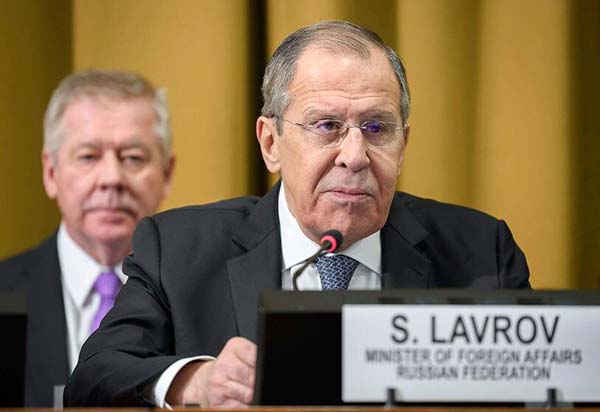
US reacted negatively to Russia’s key demand on indivisible security: Lavrov
Newswire
Moscow: The United States reacted negatively to Russia’s key demand that the accords on indivisible security be implemented responsibly, Russian Foreign Minister Sergey Lavrov said after a phone talk with US Secretary of State Antony Blinken this week.
“As for the key issue that generally prompted us to turn to the United States and the North Atlantic alliance with the initiative, the reaction was negative. I mean our demands that all must responsibly implement the agreements on indivisible security reached within the OSCE framework in Istanbul in 1999 and in Astana in 2010,” Russia’s top diplomat pointed out.
The US reply to Russia’s proposals on security guarantees that was received last week showed that “the Americans prefer to focus on discussing still important but secondary issues,” Lavrov insisted.
At the same time, the West seeks “to sink into oblivion” the key principle of indivisible security, he said. “They literally make as the cornerstone exclusively the principle of the freedom of choosing unions while completely ignoring the condition agreed at the highest level that infringing upon the security of other states in this case is inadmissible,” the Russian foreign minister elaborated.
“In order not to let this happen, when we received a reaction from Washington to our original proposals, I described this in detail in a special message and sent it to all OSCE foreign ministers and the foreign ministers of other countries to let them know our position,” Lavrov said.
Moscow is also alarmed that other NATO countries, for example, France, “insist on the need of ensuring security based on the documents that preceded the adoption of the Istanbul charter and the Astana declaration and, in particular, they quote a document of the 1990 OSCE Paris summit, which lacked a provision that the security must not be strengthened at the expense of the security of others,” he added.
Russia will insist on an honest talk with NATO and seek explanations why the West does not want to honor its commitments, the Russian foreign minister stressed.
“Today, I confirmed to Antony Blinken that after all this is an issue, which we will not allow talking down. And we will insist on an honest talk and on an honest explanation why the West is unwilling to implement its commitments or wants to implement them selectively in its favor,” Russia’s top diplomat said.
At the same time, the US Secretary of State agreed that there was a subject matter for discussion with Russia regarding the issue of indivisible security, Lavrov said.
“Tony Blinken agreed that there is a subject matter here for a further talk. We will see how things will develop,” Russia’s top diplomat said.
Russia preparing response to Washington’s proposals
Moscow is completing inter-agency coordination work on Washington’s proposals received in the process of security discussion and a subsequent report will be made to Russian President Vladimir Putin, the foreign minister said.
The news that appeared earlier on Tuesday that the United States had allegedly received Moscow’s reply to its security proposals emerged due to misunderstanding, Lavrov said.
“Today we, indeed, heard a message from the US Department of State that a reply was allegedly received from Moscow to the document that the Americans had sent as a reaction to our original proposals on the guarantees of security in Europe,” the foreign minister said. “There is a misunderstanding here.”
On December 17, the Russian Foreign Ministry published Russia’s two draft agreements on security guarantees, which Moscow expects from Washington and NATO. The agreements with the United States and the North Atlantic Treaty Organization stipulate, among other things, the US-led bloc abandoning its designs on eastward expansion along with denying membership to Ukraine, in addition to restrictions on deploying serious offensive armaments, in particular, nuclear weapons. The sides have already held several rounds of consultations in various formats but have not announced any agreements reached yet.
On January 26, the United States and NATO handed over their written reply to Moscow’s proposals on security guarantees. The US side requested that the texts of these documents should not be published. However, US Secretary of State Antony Blinken and NATO Secretary General Jens Stoltenberg outlined their basic provisions. These statements suggest that the West has refused to make concessions fundamental for Moscow, but indicated areas for further negotiations.
